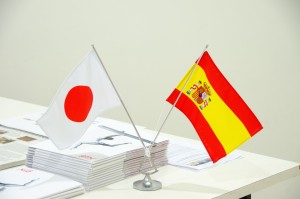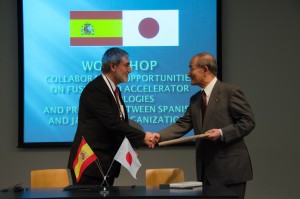
The workshop was the first industrial collaborative workshop in science field held at the Embassy of Spain in Tokyo. Image: Nobuko Kobayashi
Spain and Japan have taken an important step to strengthen their cooperation. On 13 May, a workshop called “Collaboration Opportunities on Fusion and Accelerator Technologies and Projects between Spanish and Japanese Organizations” was held at the Embassy of Spain in Tokyo. This workshop was jointly hosted by the Spanish Institute for Foreign Trade (ICEX), the Spanish Association for the Industry of Science (INEUSTAR), Centro de Investigaciones Energéticas, Medioambientales y Tecnológicas (CIEMAT), Japanese National Institutes for Quantum and Radiological Science and Technology (QST), and Japan’s Advanced Accelerator Association promoting Science and Technology (AAA). The Embassy of Spain is located in Roppongi, in the middle of Tokyo down town. The building was pretty and chic, and was an unfamiliar surroundings for me, so I felt uplifted just being there.
The aim of this workshop was to strengthen the mutual understanding and cooperation between industrial players involved in nuclear fusion and accelerator science. Another workshop for the same purpose is planned as an associated event for the European Linear Collider workshop 2016 to be held in Santander, on 1 June. Executives from seven Spanish companies took the opportunity of their trip to Asia to attend the International Particle Accelerator Conference (IPAC) held in Busan, Korea, to have face-to-face networking opportunity with Japanese companies. The meeting room was almost full with roughly 20 participants from Spain and 70 from Japan.
The workshop was opened by His Excellency Mr. Gonzalo de Benito. “Although Spain and Japan are geographically far away, and there are many differences between the two countries, we have had a close relationship for a long time,” said H.E. Benito. In 1613, the Sendai feudal lord Masamune Date dispatched the Keicho Mission to the Vatican and Spain to negotiate direct trade with Spain, and it was the first time that Japan sent a diplomatic mission to Europe. In 1868, the two countries signed a Treaty of Amity and Commerce, and diplomatic relations were established. “Taking this workshop as an opportunity, I hope that two countries will also strengthen their relationship in the field of science and technology,” he said.
Following the opening address, Mr. Masanori Matsuoka, Secretary General of AAA, gave a talk about its efforts and Japanese industry’s activities in accelerator science field. AAA,Japan’s industry and academia collaboration, was established in 2008, serving as a forum for issues on R&D, intellectual property rights and other related areas concerning the ILC as a model project. AAA has also been actively conducting public outreach for the ILC. “Now, 146 companies, universities, and laboratories are part of the AAA. This is an obvious proof of big expectations for the ILC project,” he said.
As a AAA’s counterpart, Mr. Javier Caceres, General manager of INEUSTAR, the Spanish Science Industry Association, introduced the activities of Spanish Science Industry Sector. “We are very interested in participating in the ILC project, and will support the construction when it is carried out in Japan. It is a win-win relationship and would be extremely beneficial to Spanish industry,” he said. In the workshop, participants also discussed how to achieve technology transfer between science and industry more effectively.

Letter of Intent signing ceremony: Javier Caceres of INUESTAR (left) and AAA’s Takashi Nishioka (right)
Dr. Mario Peres of CIEMAT, a Spanish public research body which focuses on energy and environment, and their related technologies, reported about fusion and particle physics projects in Spain. Spanish industry is making a strong contribution to the projects such as IFMIF (The International Fusion Materials Irradiation Facility), or European DONES, which Spain is a candidate to host and Japanese collaboration is supporting Spain’s bidding. “I hope to continue the collaboration between our two countries,” he said. From Japanese academic sector, Dr. Atsuto Suzuki, President of Iwate Prefectural University and former Director General of KEK, and Dr. Satoru Yamashita, Professor at the University of Tokyo gave talks about the status of the ILC. Suzuki talked from the perspective of Academia-Industry collaboration, and Yamashita from a scientific point of view. Also, Dr. Shinichi Ishida, Deputy Director General of Naka Fusion Institute, National Institute for Quantum and Radiological science and technology explained fusion projects.
ITER and ILC are typical examples of big science project, but I think it is very rare to have speakers from both project have talks at the academic-industrial collaboration workshop.
At the end of the workshop, a signing ceremony of a Letter of Intent between INUESTER and AAA by Mr. Takashi Nishioka, Chairman of AAA and Mr. Caceres was held. This LOI is aiming to continue exploring joint collaboration opportunities in the area of fusion and accelerator research.
This workshop was very successful and made a good starting point to enlarge international academia-industry collaboration to other countries, which is vital for the realisation of the ILC.
The latter half of the workshop was series of interesting presentations from Spanish companies, and many valuable opportunities for information exchange, and so will happen at next Spain-Japan Industrial Session to be held on 1 June, in Santander to catch up. Please join! You will find the detail of the session here.

Recent Comments